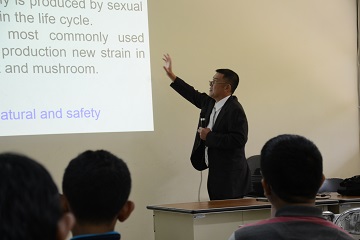IPB Students Attend General Lecture of Mycology from Japanese Professor

Prof. Dr. Tadanori Aimi, professor of Tottori University, Japan delivered General Lecture Genetics and Breeding of Mushroom to Institut Pertanian Bogor students specifically for Biology department student, Faculty of Mathematic and Natural Science, and Agronomy and Horticulture department, Faculty of Agriculture, Thursday (9/8) in IPB Campus Dramaga.
Prof. Tadanori explained about genetic reproduction inside fungus, specifically Basidiomycota. “Fungus reproduction can happen naturally, it means the occurrence of a combination of two fungi base structures, otherwise known as hyphae, which are different or similar. Engineering of the process can increase the diversity of fungi or improve their quality. Some of these reproductive techniques include cross breeding, mutation, protoplasmic fusion, and genetic engineering,” said Prof. Tadanori.
The technique encourages Prof. Tadanori to try to develop it. He and his colleagues developed a system of reproductive engineering in fungi. This system, if run properly, will produce new offspring that have antibiotic resistance. This system they have run on the mushroom species Nameko. The result is the P. nameko fungus has high resistance to carboxin fungicides and hygromycin B. antibiotics.
Research conducted by Prof. Tadanori triggered several questions both lecturers and students. They ask about the potential of fungi that are available if done engineering. "Only limited," replied the Professor. Fruit body size, for example, can be roughly engineered only twice as much, instead of ten or a hundred times.
This lecture opens the horizon of knowledge for the participants. "Beyond the limits," said one lecturer from the Department of Biology, IPB. The existence of fungus species that are engineered is new knowledge for him. "I got useful new information," he explained. On that occasion, Prof. Dr. Ir. Lisdar A. Manaf as a collaborator from Prof. Tadanori. (NR)



